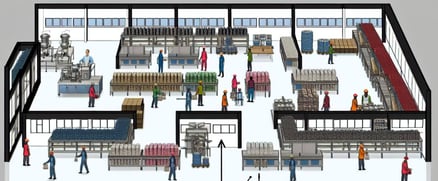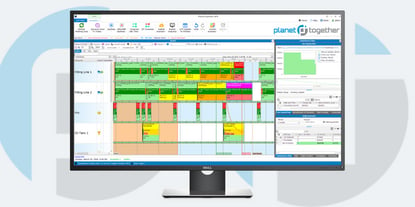Vendor Relationship Optimization
Supply Chain Managers play a pivotal role in ensuring seamless operations, optimizing resources, and fostering strong vendor relationships. In today's digital era, integration between advanced planning and scheduling (APS) tools like PlanetTogether and Enterprise Resource Planning (ERP) systems has revolutionized supply chain management, offering unprecedented capabilities for optimization and efficiency.
In this blog, we look into the significance of supply chain management and vendor relationship optimization, exploring how integration between PlanetTogether and leading ERP systems can drive tangible benefits for industrial manufacturing facilities.

Understanding Supply Chain Management and Vendor Relationship Optimization
Supply chain management encompasses the end-to-end process of sourcing, procurement, production, and distribution of goods. It involves managing the flow of materials, information, and finances to ensure products are delivered to customers efficiently and cost-effectively. Central to effective supply chain management is the optimization of vendor relationships.
Vendors are strategic partners whose performance directly impacts the overall efficiency and competitiveness of a manufacturing facility. Building and nurturing strong vendor relationships is essential for mitigating risks, reducing costs, and enhancing product quality.
Challenges in Supply Chain Management
Industrial manufacturing supply chains face numerous challenges, including:
Demand Variability: Fluctuations in demand can lead to overstocking or stockouts, impacting production schedules and customer satisfaction.
Supply Chain Disruptions: Disruptions such as natural disasters, geopolitical issues, or supplier failures can disrupt the flow of materials, leading to delays and increased costs.
Inventory Management: Balancing inventory levels to meet demand while minimizing carrying costs and obsolescence is a perpetual challenge.
Coordination and Communication: Coordinating activities across multiple stakeholders and ensuring seamless communication is essential for efficient supply chain operations.
Vendor Performance: Monitoring and managing vendor performance to ensure adherence to quality standards, timely deliveries, and competitive pricing can be daunting tasks.

Integration between PlanetTogether and ERP Systems
Integration between PlanetTogether, a leading APS solution, and ERP systems such as SAP, Oracle, Microsoft Dynamics, Kinaxis, and Aveva offers a comprehensive approach to supply chain management. This integration enables seamless data exchange and synchronization between planning, scheduling, and execution processes, unlocking several benefits:
Real-Time Visibility: Integration provides real-time visibility into inventory levels, production schedules, and supplier performance, empowering Supply Chain Managers to make informed decisions promptly.
Demand Forecasting and Planning: By leveraging historical data and advanced algorithms, integrated systems facilitate accurate demand forecasting and production planning, minimizing stockouts and excess inventory.
Optimal Resource Utilization: Integration enables efficient allocation of resources, including materials, equipment, and labor, to optimize production schedules and minimize idle time.
Just-in-Time Inventory Management: Tight integration between APS and ERP systems facilitates just-in-time inventory management, reducing carrying costs and improving cash flow.
Streamlined Procurement: Automated procurement processes, supported by integration, streamline supplier interactions, from purchase requisition to payment, enhancing efficiency and reducing lead times.
Vendor Performance Management: Integrated systems provide insights into vendor performance metrics, such as on-time delivery, quality, and lead times, enabling proactive management of vendor relationships.
Continuous Improvement: Data analytics and reporting capabilities offered by integrated systems facilitate continuous improvement initiatives, identifying bottlenecks, inefficiencies, and opportunities for optimization.

Best Practices for Vendor Relationship Optimization
In addition to leveraging integrated APS and ERP systems, Supply Chain Managers can adopt the following best practices to optimize vendor relationships:
Establish Clear Expectations: Clearly communicate expectations regarding quality standards, delivery schedules, and pricing to vendors to ensure alignment.
Foster Collaboration: Foster open communication and collaboration with vendors, treating them as strategic partners rather than mere suppliers.
Performance Metrics and KPIs: Define key performance indicators (KPIs) and regularly monitor vendor performance against these metrics to identify areas for improvement.
Proactive Issue Resolution: Address issues and concerns promptly, collaborating with vendors to implement corrective actions and prevent recurrence.
Vendor Development Programs: Invest in vendor development programs to enhance their capabilities and align them with the organization's strategic objectives.
Continuous Feedback: Provide constructive feedback to vendors, highlighting areas of excellence and opportunities for improvement.
Contract Management: Establish clear contracts outlining terms and conditions, including penalties for non-compliance and incentives for exceeding expectations.
Diversification: Diversify the vendor base to mitigate risks associated with dependence on a single supplier and explore opportunities for innovation and cost savings.
Relationship Building: Invest time and effort in building strong, long-term relationships with vendors based on trust, mutual respect, and shared goals.
Effective supply chain management and vendor relationship optimization are critical for industrial manufacturing facilities to remain competitive in today's dynamic marketplace. Integration between advanced planning and scheduling tools like PlanetTogether and ERP systems offers a powerful solution to address the complexities of supply chain management.
By leveraging integrated systems and adopting best practices for vendor relationship optimization, Supply Chain Managers can enhance operational efficiency, reduce costs, mitigate risks, and foster strategic partnerships with vendors, driving sustainable growth and success for their organizations.
Embracing digital transformation and collaboration with vendors are key imperatives for navigating the challenges and seizing opportunities in the ever-evolving landscape of industrial manufacturing supply chains. Are you ready to take your manufacturing operations to the next level? Contact us today to learn more about how PlanetTogether can help you achieve your goals and drive success in your industry.























LEAVE A COMMENT